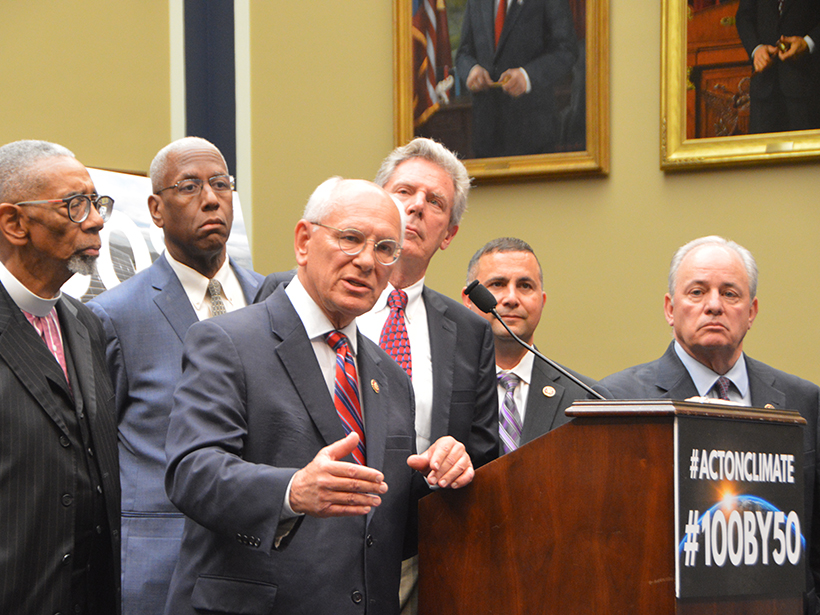The House Committee on Energy and Commerce announced on 23 July that it has adopted an ambitious goal for the United States to achieve a 100% clean economy with zero greenhouse gas pollution by 2050.
“The climate crisis is here, and it requires serious federal leadership that’s up for the challenge.”
“Communities across the country are suffering from historic flooding, raging wildfires, increasingly severe storms, extreme heat, and persistent droughts,” said committee chair Rep. Frank Pallone, Jr. (D-N.J.), who appeared at a Tuesday briefing on Capitol Hill to announce the goal. “The climate crisis is here, and it requires serious federal leadership that’s up for the challenge.”
Beginning today, the committee is holding a new series of hearings about climate change, with the initial hearing focusing on pathways to decarbonize the U.S. economy, according to Pallone. Upcoming hearings will focus on reducing industrial and transportation emissions and modernizing the electrical grid, among other topics. The committee also plans to hold stakeholder meetings, call for bipartisan and bicameral support, and introduce climate legislation later this year.
“If we don’t get to net-zero greenhouse gas emissions by 2050,” Pallone said in explaining the target year, the consequences are “going to be catastrophic.” A 2018 report by the Intergovernmental Panel on Climate Change stated that limiting global warming this century to 1.5°C would require net human-caused emissions of carbon dioxide to be reduced to zero by about 2050.
Pallone compared the committee’s plan to the Green New Deal resolution that was introduced earlier this year by Rep. Alexandria Ocasio-Cortez (D-N.Y.) and Sen. Ed Markey (D-Mass.). He said that the Green New Deal resolution contains many good ideas but added that the committee is trying to develop legislation. “What we are really trying to do here is come up with a united front that is driven by the scientific community,” he said. The ideas that come from the Green New Deal “are things that we certainly want to hear. But the idea is that there would be specific legislation, a comprehensive package.”
The Green New Deal states that reaching net-zero carbon dioxide emissions “should be accomplished through a 10-year national mobilization.” Other countries, including France, Germany, and Japan, use 2050 as the target date. “We just think that [the 2050] target is more realistic,” Pallone said. “We could develop certain [goals] that have to be met by 2030 or 2040 as well, as part of this 2050 goal.”
An Ambitious Goal
For many years, “the House ignored climate change, the climate crisis … Because of that, we now have to catch up.”
“Is 2050 ambitious? Absolutely,” said Rep. Paul Tonko (D-N.Y.), chair of the Energy Subcommittee on Environment and Climate Change. He said that moving forward with the committee’s initiative is not only about resolving issues related to the environment and environmental injustice. It’s also a chance “to embrace opportunity” with innovative solutions, he said. “Whoever does that first will be the nation that will be the kingpin in the international economy.”
Tonko said that the country “cannot afford another delay” and that dealing with climate change “demands urgency.” For many years, “the House ignored climate change, the climate crisis,” he said. “Because of that, we now have to catch up.”
He added that Congress needs to be working to address climate change now “so that when there is a force within the White House that accepts the concept of climate change, we can move forward aggressively and resolve the people’s concerns.”
The newly announced plan received support from a number of conservation groups. Sara Chieffo, vice president of government affairs for the League of Conservation Voters, told Eos that she is excited about the committee’s goal of a 100% clean energy economy by 2050. “We see the Green New Deal as a very important addition to the conversation” about climate change, Chieffo said. The committee’s plan, she said, is about how we “actually make these visionary goals into legislation” and how we do that in an inclusive way so that all stakeholders are heard.
Business Council for Sustainable Energy president Lisa Jacobson said that her group “supports a policy approach to reduce greenhouse gas emissions that is economy-wide, incorporates market-based mechanisms, and embraces the full suite of clean energy technologies.” Options for such an approach “include carbon pricing measures as well as complementary energy, infrastructure, and transportation policies that both reduce emissions and improve our nation’s resilience to climate change.”
“We’ve got to do something by 2050 that gets us to zero carbon emissions. If the president wants to go along with it, fine. If not, we’ll see what happens after the next election.”
“I would like to get some of the Republicans on board here, and I’d like to get the president to sign all or some of this legislation that we’re developing” in the committee, Pallone told Eos in an interview. However, he said of the president, “you’re talking about someone who denies that climate change is even human induced and who wants to withdraw from the Paris Agreement.”
“We’ve got to do something by 2050 that gets us to zero carbon emissions,” Pallone added. “If the president wants to go along with it, fine. If not, we’ll see what happens after the next election.”
—Randy Showstack (@RandyShowstack), Staff Writer
Citation:
Showstack, R. (2019), House committee calls for zero greenhouse gas pollution by 2050, Eos, 100, https://doi.org/10.1029/2019EO129595. Published on 24 July 2019.
Text © 2019. AGU. CC BY-NC-ND 3.0
Except where otherwise noted, images are subject to copyright. Any reuse without express permission from the copyright owner is prohibited.

